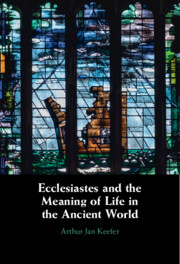Book contents
- Ecclesiastes and the Meaning of Life in the Ancient World
- Ecclesiastes and the Meaning of Life in the Ancient World
- Copyright page
- Dedication
- Contents
- Preface
- Abbreviations
- 1 Introduction
- 2 Suffering and Meaning in Egyptian Literature
- 3 Suffering and Meaning in Mesopotamian Literature
- 4 Suffering and Meaning in Greek Literature
- 5 Ecclesiastes and the Meaning of Life
- 6 Ecclesiastes, Suffering and Joy
- 7 In Context
- Bibliography
- Index of Sources
- Index of Authors and Topics
3 - Suffering and Meaning in Mesopotamian Literature
Published online by Cambridge University Press: 12 April 2022
- Ecclesiastes and the Meaning of Life in the Ancient World
- Ecclesiastes and the Meaning of Life in the Ancient World
- Copyright page
- Dedication
- Contents
- Preface
- Abbreviations
- 1 Introduction
- 2 Suffering and Meaning in Egyptian Literature
- 3 Suffering and Meaning in Mesopotamian Literature
- 4 Suffering and Meaning in Greek Literature
- 5 Ecclesiastes and the Meaning of Life
- 6 Ecclesiastes, Suffering and Joy
- 7 In Context
- Bibliography
- Index of Sources
- Index of Authors and Topics
Summary
This chapter assesses Mesopotamian literature that was concerned with suffering and categories of meaning. Do the “fictional royal autobiographies” of Assyria or the “skeptical” literature of Babylonia, for example, also exhibit an interest in human suffering that bears a relation to the meaning of life categories? Based on The Cuthean Legend of Naram-Sin, Sin of Sargon, Ludlul Bēl Nēmeqi, The Babylonian Theodicy, Counsels of a Pessimist, and the Epic of Gilgamesh, which receives extended treatment due to its links with Ecclesiastes, I conclude that Mesopotamian texts too provide evidence of people “suffering the meaning of life.”
- Type
- Chapter
- Information
- Publisher: Cambridge University PressPrint publication year: 2022

